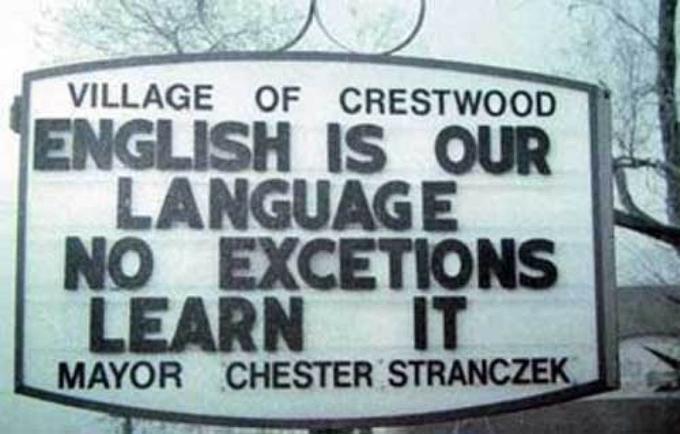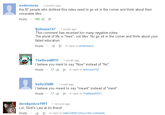Skitt's Law
Part of a series on Grammar Nazi. [View Related Entries]
About
Skitt's Law is an Internet axiom which states that people who correct other's spelling or grammar are likely to commit errors themselves. It is often used as a humorous critique of the pedantic Internet users known as Grammar Nazis. Several similar laws referring to the same principle have arisen independently, but Skitt's Law is the most prevailing term.
Origin
On April 26th, 1999, a member of the Usenet group alt.usage.english[3] G. Bryan Lord (a.k.a. Skitt) coined the term in a thread discussing the nuances of using the titles "Ms. and "Miss." When user Perchprism replied remarking that the group's rules may make some users to be overly self-conscious, Skitt replied with the definition of "Skitt's Law":
"You've entered my vocabulary: Skitt's Law, a corollary of Murphy's Law, variously expressed as "any post correcting an error in another post will contain at least one error itself" or "the likelihood of an error in a post is directly proportional to the embarrassment it will cause the poster." The effect is, of course, magnified a hundredfold if the post is in reply to Skitt himself."
Similar Laws
On May 15th, 1990, alt.sex[17] user Andrew Bell replied to a thread regarding grammar corrections that are incorrect with "Bell's First Law of Usenet":
"Bell's First Law of USENET: Flames of spelling and/or grammar will
have spelling and/or grammatical errors."
In March of 1992, Austrilian John Bangsund of the Victorian Society of Editors coined "Muphry's Law" in the Society of Editors Newsletter[10] as an editorial version of Murphy's Law.
"Muphry's Law dictates that (a) if you write anything criticizing editing or proofreading, there will be a fault of some kind in what you have written; (b) if an author thanks you in a book for your editing or proofreading, there will be mistakes in the book; (c) the stronger the sentiment expressed in (a) and (b), the greater the fault; (d) any book devoted to editing or style will be internally inconsistent.
On April 20th, 1999, just six days prior to Skitt's Usenet post, Kith.org webmaster Jed Hartman posted an article titled "Nitpickers R Us", which introduced "Hartman's Law of Precriptivist Retaliation."
"Hartman's Law of Prescriptivist Retaliation states that any article or statement about correct grammar, punctuation, or spelling is bound to contain at least one eror."
In the October 2001 issue of the language quarterly publication Verbatim[9], American lexicographer Erin McKean was quoted describing what she referred to as "McKean's Law."
"Any correction of the speech or writing of others will contain at least one grammatical, spelling, or typographical error."
Spread
On December 3rd, 2003, Skitt's Law was referenced in a thread on the English Forums[12] regarding the nuances of sex and gender rules. On November 10th, 2004, Vocaboly[13] forums member Maria Conlon mentioned the adage in a thread regarding the correct usage of the responses "me too" and "you too." On August 8th, 2005, The Straight Dope[15] forums member Mops posted a thread questioning if there was a law for spelling corrections that contained spelling mistakes, to which user Catalyst replied that it was known as "Gaudere's Law" on Straight Dope and "Skit's Law" and "Tober's Lor" elsewhere. On October 23rd, 2009 The Telegraph[14] published an article tittled "Internet rules and laws: the top 10, from Godwin to Poe", listing Skitt's Law as the fourth Internet rule in the top ten list. On the following day, an entry for Skitt's Law was created on the Rational Wiki[11], which pointed out its similarities to Muphry's Law and McKean's Law. On December 10th, the blog Net Culture Talk[4] published a post titled "Internet Meme: Skitt's Law", claiming the point of the law was to point out that "everyone makes typos."
Examples



In addition to the comments and texts that are found online and fall under the definition of Skitt's Law, numerous images of xenophobic picket signs and bumper sticker messages advocating the proper use of the English language in faulty grammar have gone viral during the height of the Tea Party Movement between 2010 and 2011, which subsequently became a popular subject of online ridicule under the neologism "Teabonics".




Search Interest
Not available.
External References
[1] Rational Wiki – Skitt's Law
[2] Wikipedia – Murphy's Law
[3] Google Groups – to step down
[4] Net Culture Talk – Internet Meme – Skitt's Law
[5] Switched – Skitts Law
[6] Wordpress – Typos and Grammer – Skitt's Law
[7] Mathkb – The Spider and the Fly
[8] Kith.org – Nitpickers R Us
[9] World Wide Words – Verbatim
[10] Pacific.net – Muphry's Law
[11] Rational Wiki – Skitt's Law
[12] English Forums – Skitt's Law
[13] Vocaboly – Me Too You Too
[14] The Telegraph – Internet Rules and Laws – The Top 10, From Godwin to Poe
[15] The Straight Dope – Is there a name for this law?
[16] Wordpress – Skitt's Law
[17] Google Groups – Stories and writing quality
Recent Videos
There are no videos currently available.









![Youtube commenters are always the best e MISHKA: DUBSTEP DOG-YouTube - Windows Internet Exploren マ 0 http://www.youtube.com/watch?v=pQMSfIPuZw&feature=fvwrel Search NCH Email Notifier Favorites MISHKA DUBSTEP DO. . X 0 Nickelback Photograph- Ding Ding Dong Gunther O More Than Words (Extrem how to virgin Bing ▼ Ou Q Browse Angry SUBTITLED by gardea23 1,026,457 views Husky Dog Talking - 74,159,830 views Sweet Mishka 117,929 views Mishka sings in the 1,742,556 views DUBSTEP GRANDMA [Skifcha Cat Parody] by ) 0:04 / 0:24 635,895 views MISHKA: DUBSTEP DOG YouTube Dubstep Dubstep is a genre of elect 661,800 videos stereo skifcha dubs by hawtpawkithero 1,721,752 THANKS FOR SUBSCRIBING! Subscribe 16,253 likes, 3,046 dislikes Details Share Add to 1-1 1,509,787 views Dubstep . Πapo by kaizerinio34 About this video H Uploaded on Feb 24, 2012 Mishka the Talking Husky does Dubstep. Womp! 0 77.164 views Thanks to sssShawnnnn for the song! http:llyoutu.be/LitlscddNf8 600lbs Sumo Vs 1691I Show more -MMA Fighter by Em0JokE 7,889,717 views Top Comments its a paroty you stupid pice of s--- yourdadwooo222 in reply to digablus90 (Show the comment) 2 days ago 10 hours videos: This sparta!! remix by oskar1101pl 39 3,765,006 views The word is spelled "parody", but thank you for slamming the fool SquireKoMa in reply to yourdadwooo222 (Show the comment) 1 day ago 32 Supercats: Episode 1 The Funniest Cat Vi by MeowFace3000 Video Responses see all 20,642,154 views This video is a response to Mishka says "TM AWESOME" Funny Cats! @ CMeu KOTbl! by MUvsArsenal ,994,460 views 2 DOGS SKYPE Mishka & 208,475 views "Coffee 117,095 views All Comments (4,613) see all Sign In or Sign Up now to post a comment! funny crazy cats )) by TVanimalsVideo 1,835,681 views rasmusazn reply to jolocoloco (Show the comment) 1 hour ago pider Love Cocaine an 1,059,913 views e More You Know krypekeeper in reply to yourdadwooo222 (Show the comment) 2 hours ago Extreme ldiots ilation you dont sa JudygraFF in reply to SquireKoMa (Show the comment) 4 hours ago 8,735,116 views no you get him wrong, he just wants a DUBSTEP: PARROT version theFlowC in reply to SquireKoMa (Show the comment) 7 hours ago by 1,860,141 views Dead Space 2 Deat byStejz in reply to SquireKoMa (Show the comment) 8 hours ago by NOSFERATU628 aro 4,218 views mijte in reply to yourdadwo00222 (Show the comment) 14 hours ago Dubstep Beatboxer by Theltaliausa 8,133,775 views I think you misspelled "Piece" 2themaxmovies in reply to swiftrun99 (Show the comment) 15 hours ago 10 Cutest Cat Momer by LiquidGenerationTube 8,407,033 views EpicRobloxian22 in reply to EpicRobloxian22 (Show the comment) 17 hours ago CUTEST](https://i.kym-cdn.com/photos/images/list/000/334/383/a79.jpg)


Top Comments
Serious Business
Jun 16, 2012 at 02:09PM EDT
BlogDog123
Jun 15, 2012 at 09:47PM EDT